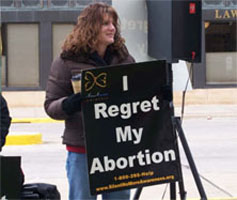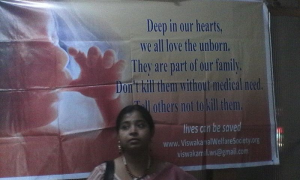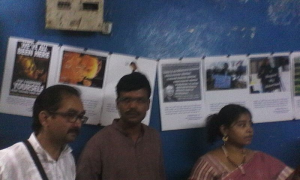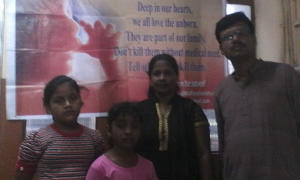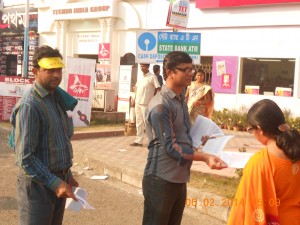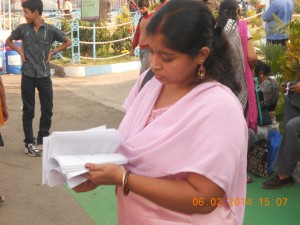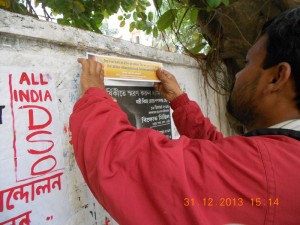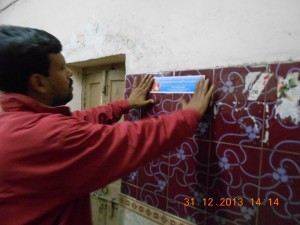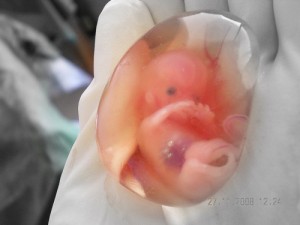Shreya was too tiny at first to be seen by anyone’s eye. She joined our human family in this world of ours some time in March 2014.
Shreya’s mother, Karuna, realized one day that month that something had changed inside her body. What had happened was that little Shreya had started out on a journey of growth, a process of urgent and continual change, preparing for the day when she would be able to come out into the air, and would have a chance to touch from outside that woman who had surrounded her and nourished her for months.
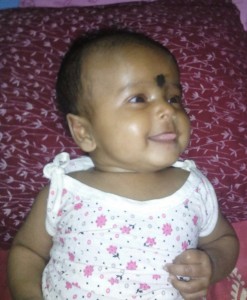
Shreya at 3-1/2 months, in April 2015
But perils lay ahead. Abortion under some circumstances is legal in India prior to 20 weeks’ gestation, and there is little strictness about the circumstances. Even in the complete absence of such circumstances, abortion is not hard to arrange. There are 1500 abortions every day in West Bengal alone.
And meanwhile, Karuna’s husband had decided he no longer wanted anything to do with Karuna.
After their marriage, Karuna had gone to live with her husband’s family. But Karuna had never received kind treatment from the family. After becoming pregnant in the midst of an already-inhuman living situation, she had had some kind of breakdown and had entered a hospital. When she was ready to be released, her husband and his parents did not come to pick her up. They did not want her back.
She returned to her own parents. They could give her shelter, but they could not afford the financial burden of her expected child. Karuna was unemployed, her husband having been her sole source of support.
Meanwhile, Shreya continued growing with a biological kind of zeal, constantly exploring the little space in which she lived. She was not able to know that adults sometimes invade that space with all the latest and most ingenious instruments at their command, or what they do once they invade it. At about the 16-weeks point, in July 2014, Karuna came to a decision: she would get an abortion.
But just at that moment, a relative of Karuna’s came in touch with the Viswakamal Welfare Society. That relative explained the whole situation to the Viswakamal secretary. At first through the relative, and then in direct communications with Karuna, the secretary reminded Karuna of the value and uniqueness of her child’s life, and conveyed to her a message of hope, although at that point he could not promise any tangible help.
Karuna listened. She soon realized that she would never be able to pass a death sentence on her child, come what may.
She was now resolutely determined to give life to her daughter, but still her frightening financial position remained. Viswakamal members immediately became active. Soon they had found two sponsors, each of whom pledged to give Rs. 500 a month for however long might be necessary. It was not much, but it was just enough to make Karuna’s situation workable. And some time in December 2014, Shreya made her move, leaving the space inside of her mother and finding her mother’s arms.
And Karuna had found a purpose. She has an education, and expects as soon as Shreya has grown a little to find a decent job. And then she wants to help all the other Shreyas of the world, and make sure they get the chance that every person deserves.
Those who have worked in the pro-life cause in the US say that they often hear from rueful post-abortive women, “If just one person had supported me in any way, I wouldn’t have done it.”

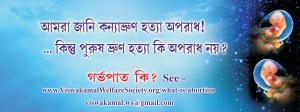


![[Women's Day]11038111_821692954577604_5391019288809847500_n](http://viswakamalwelfaresociety.org/wp-content/uploads/2015/04/Womens-Day11038111_821692954577604_5391019288809847500_n-300x240.jpg)
